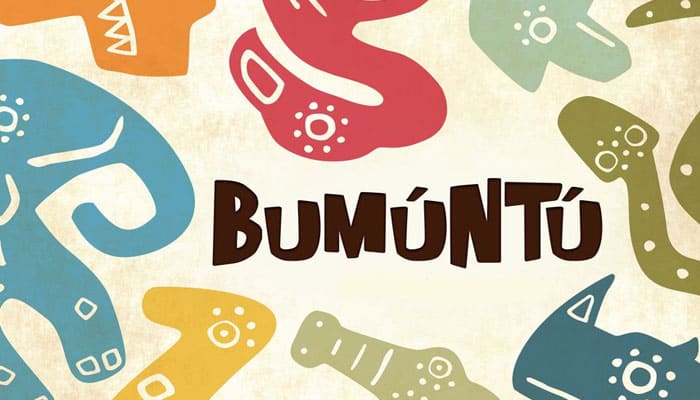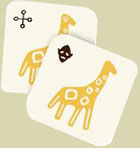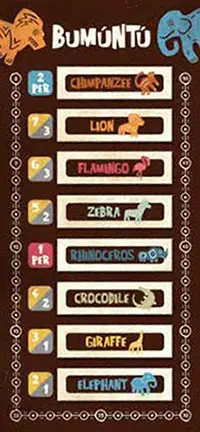
Bumuntu is a lightweight strategy game based on the culture and folklore of the Bakongo tribes. Descendants of the Kingdom of Kongo, the Bakongo people are the largest group of tribespeople in central Africa.
A common theme in African folklore is that animals are wise creatures who teach humans to do good and moral things. "Bumuntu" means "Civilization" in Kikongo, the most common language of the Bakongo tribes.
Components

- 1 Jungle Board
- 80 Animal Tiles
- 5 Tribal Leader Pawns
- 1 Animal Favor Board
- 10 Animal Favor Markers
- 32 Food Chips
- 5 Player Shields
- Instructions
Object of the Game
As a tribal leader, you will follow the guidance of the animals, journeying through the jungle in hopes of winning their favor.
At the end of the game, the leader who has accumulated the most favor wins!
Setup

-
Separate the Animal Tiles by animal type (all Giraffes together, all Lions together, etc).. You should have ten piles of eight tiles each.
-
As a group, players should decide which eight piles of animals to play with. Note that some animals will better allow you to move around the board, while others will allow you to "attack" opponents or defend from their attacks.
A good recommendation for a beginner's game is as follows: Giraffe - Zebra - Chimpanzee - Tarantula - Lion - Crocodile - Black Mamba - Elephant
-
Return the unused Animal Tiles to the box; you will not use them this game. Collect and shuffle the in-play Animal Tiles; you should have a total of 64. Randomly place the in-play Animal Tiles onto the Jungle Board, one tile in each square.
-
Find the corresponding Favor Marker for each of the eight animals in play. Return the other two Favor Markers to the box; you will not use them this game. Shuffle and randomly place the eight in-play Favor Markers on the Favor Board, one in each spot.
-
Each player should choose a color for their Tribal Leader Pawn and take a Player Shield. Place the Food Chips to the side of the board within reach of all players. Randomly decide the starting player.
This player will start by "entering the jungle". To do so, they will place their pawn on any Animal Tile in the outer ring of the jungle. All other players will follow suit in clockwise turn order. Starting with the first player, players will take turns in order.

A Few Notes About Movement
All movement is omnidirectional, meaning that you can move up, down, left, right, or diagonal. The only animals that limit this are the Zebra and the Chimpanzee.
You may not move through or into another space occupied by an opponent, unless using the Crocodile's ability.
Empty jungle spaces (with no tile on them) are still considered to be in play. You may land on them or move an opponent onto them. If a player starts their turn on an empty jungle space, they may only move one space unless mitigated by food chips.
When using an animal's ability, you must be able to complete the movement in order to collect its tile. If you are unable to move in the way that the animal guides you, you may not collect its tile.
In the very rare chance that you are unable to move on your turn, your turn is forfeited.
Game Play
On your turn, you may move in one of two ways:
-
You may move your Tribal Leader Pawn one space in any direction (up, down, left, right, or diagonal). Once you do, this ends your turn. Or...
-
If you are on an Animal Tile, you may move according to that animal's movement ability. If you do, you will collect that tile and perform its Bonus Action, if applicable.
Turn order takes place as follows:

1. Play Food Chips (optional)

If you have any Food Chips behind your shield, you may discard any number of them to move your Tribal Leader Pawn that many spaces in the jungle.
All movement is up, down, left, right, or diagonal.
2a. Move one space in any direction
Move your Tribal Leader Pawn one space in any direction (up, down, left, right, or diagonal). Once you have done that, the turn passes to the next player.
-or-
2b. Move according to the animal you're on
If you are on an Animal Tile, you may move according to that animal's ability. Be sure to complete the entire animal's ability (including moving other players or tiles) before continuing.
Collect the animal tile that you used
Collect the Animal Tile that you just moved off of. Place this behind your Player Shield.

Perform tile's bonus action, if applicable
Every tile has a bonus symbol on it. If you've collected an advancement tile (with a solid dark background) or food tile (with the  symbol), you are able to take a Bonus Action after you've collected it. The Bonus Actions are as follows:
symbol), you are able to take a Bonus Action after you've collected it. The Bonus Actions are as follows:
Advancement Tiles

There are 16 advancement tiles in play (2 for each animal). When you pick up an advancement tile, you may affect the Favor Board by swapping any two adjacent Favor Markers on it.
Be strategic here, because the Favor Board will award points to players at the end of the game and this is your chance to help decide how much favor each animal will award.
Note: The top-most and bottom-most spots are not considered adjacent.
The game ends once all 16 advancement tiles have been picked up.
Food Tiles

There are 32 food tiles in play (4 for each animal). When collected, players also take a Food Chip along with the tile.
These Food Chips should be kept behind your Player Shield and may be used on the first phase of future turns.
3. Turn passes to the next player
Your turn is over and the player to your left begins their turn. Players continue in clockwise order until all sixteen advancement tokens have been picked up.
You will notice two other types of tiles on the board: Nkisi ( ) and Yowa (
) and Yowa ( ). These bonus tiles do not give you a Bonus Action on your turn, but instead will be used in scoring at the end of the game (see Scoring).
). These bonus tiles do not give you a Bonus Action on your turn, but instead will be used in scoring at the end of the game (see Scoring).

End of the Game
The game ends once the sixteenth advancement tile has been picked up. The player who picked it up makes their final adjustment to the Favor Board.
Players should then move their Tribal Leader Pawns to the "0" space on the scoring track (on the Favor Board) and begin scoring. The player with the most favor wins.
Scoring
Favor Board

The Favor Board is how most players will receive the majority of their favor. The animals in the "2 per" and "1 per" slots will offer that much favor for each tile of that animal a player has collected.
In the example on the right, players would receive two favor for each Chimpanzee tile they've collected and one favor for each Rhinoceros tile they've collected.
For the remaining spots, favor is awarded to the player(s) who have the most tiles of each animal.
The player with the most tiles of a given animal will receive favor equal to the higher number (with a gold background).
The player with the second-most tiles of a given animal will receive favor equal to the lower number (with a silver background). No other players will score points.
In the example above, the player with the most Lions will receive seven favor. The player with the second most Lions will receive three favor.
Ties are resolved as follows:
Tie for first: All tied players receive favor equal to the number in silver. No additional favor is awarded.
Tie for second: The player in first receives favor equal to the number in gold. All players tied for second receive one favor each. No additional favor is awarded.
Players must have at least one tile of an animal in order to earn favor for that animal.
Bonus Favor: Nkisi ( )
)
There are 8 Nkisi tiles in play (1 for each animal). When collected, players keep these tiles and they are scored at the end of the game. Nkisi offer favor to players based on the number they have collected throughout the game. This can be found on the chart here and on your Player Shield:

Nkisi are small, spiritual statues kept in the houses of Bakongo tribespeople. They are believed to bring good luck and blessings.
Bonus Favor: Yowa ( )
)
There are 8 Yowa tiles in play (1 for each animal). When collected, players keep these tiles and they are scored at the end of the game.
Yowa offer 6 Favor to the player who has collected the most and 3 Favor to the player with the second most. Ties are resolved in the same way as with the Favor Board.
Yowa are religious symbols and are often found at prayer spots. The four points represent the four phases of the sun.

Animal Movement / Abilities
These animals will help you get around or manipulate the board.

Giraffe
Move one, two, or three spaces.
Your movements do not all need to be in the same direction.
You may use the Giraffe's ability to move only one space. If you do so, you may still collect the Giraffe's tile.

Chimpanzee
Move diagonally any number of spaces.
Movement must all be in the same direction.
You may use the Chimpanzee's ability to move only one space. If you do so, you may still collect the Chimpanzee's tile.

Zebra
Move horizontally or vertically any number of spaces.
Movement must all be in the same direction
You may use the Zebra's ability to move only one space. If you do so, you may still collect the Zebra's tile.

Flamingo
Fly up into the air and move to any unoccupied Flamingo (including the one you were just on), then move one space in any direction.
When collecting the Flamingo, be sure to collect the tile that you started on, NOT the one that you flew to.
Remember that the Flamingo can fly to itself, then move one space. Sometimes, this may be your only option (i.e. if all other Flamingos are occupied or if you are on the last Flamingo).

Tarantula
Move one or two spaces, then you may move any unoccupied tile to any empty space.
If moving two spaces, they do not need to be in the same direction.
You may move any unoccupied tile on the board to any empty space. You may also choose not to move a tile.
These animals will let you "attack" other players or defend you from others' attacks.

Lion
Move exactly 3 spaces in one direction. Then move an opponent one space in that same direction.
You must be able to move all spaces and move an opponent's pawn in the same direction in order to use the Lion's ability. If you cannot perform both actions, you cannot use the Lion's ability.
As a reminder, you may not move through an opponent's pawn while moving.

Crocodile
Move one or two spaces. If you land on an opponent, move them one space in any direction.
Note: The Crocodile is the only animal that allows you to land where another player is.
If moving two spaces, they do not need to be in the same direction.
You choose the space that the other player moves to.

Black Mamba
Move one or two spaces, then move all adjacent opponents one space away from you if possible.
If moving two spaces , they do not need to be in the same direction.
Adjacent opponents are ones that are in one of the eight squares surrounding the space where you end your turn. When you finish your movement, all adjacent opponents move one space in the direction opposite you.
Opponents may not be able to move if they are obstructed by either another player or the edge of the jungle. If this is the case, they simply do not move.
You may still collect the Black Mamba's tile even if you do not end adjacent to any opponents, or if you are unable to move any opponents.

Rhinoceros
Charge as far as you can in one direction, pushing any opponents you encounter.
Unobstructed, a Rhinoceros will always move to the edge of the jungle. Remember that empty jungle spaces are still in play.
If you encounter an opponent as you move, you will "push" them to the edge of the board with you. That opponent will occupy the edge space on the board, and you will occupy the space before them.
You may push multiple opponents at the same time. They will continue to push each other until one reaches the edge of the jungle
The Rhinoceros stops if you encounter an opponent on an Elephant tile.

Elephat
Move exactly 2 spaces in one direction. Other players cannot move you while you are on the Elephant.
The Elephant is the only animal with a passive ability. A player on an Elephant cannot be moved (even if they want to be) by the Lion, Black Mamba, Crocodile, or Rhinoceros.
In order to collect the Elephant's tile, you must move exactly two spaces in any direction. If you are unable to move exactly two spaces, unobstructed, then you may not use the Elephant's movement ability (the passive ability, however, is still in play while you are on the tile).
Continue Reading

